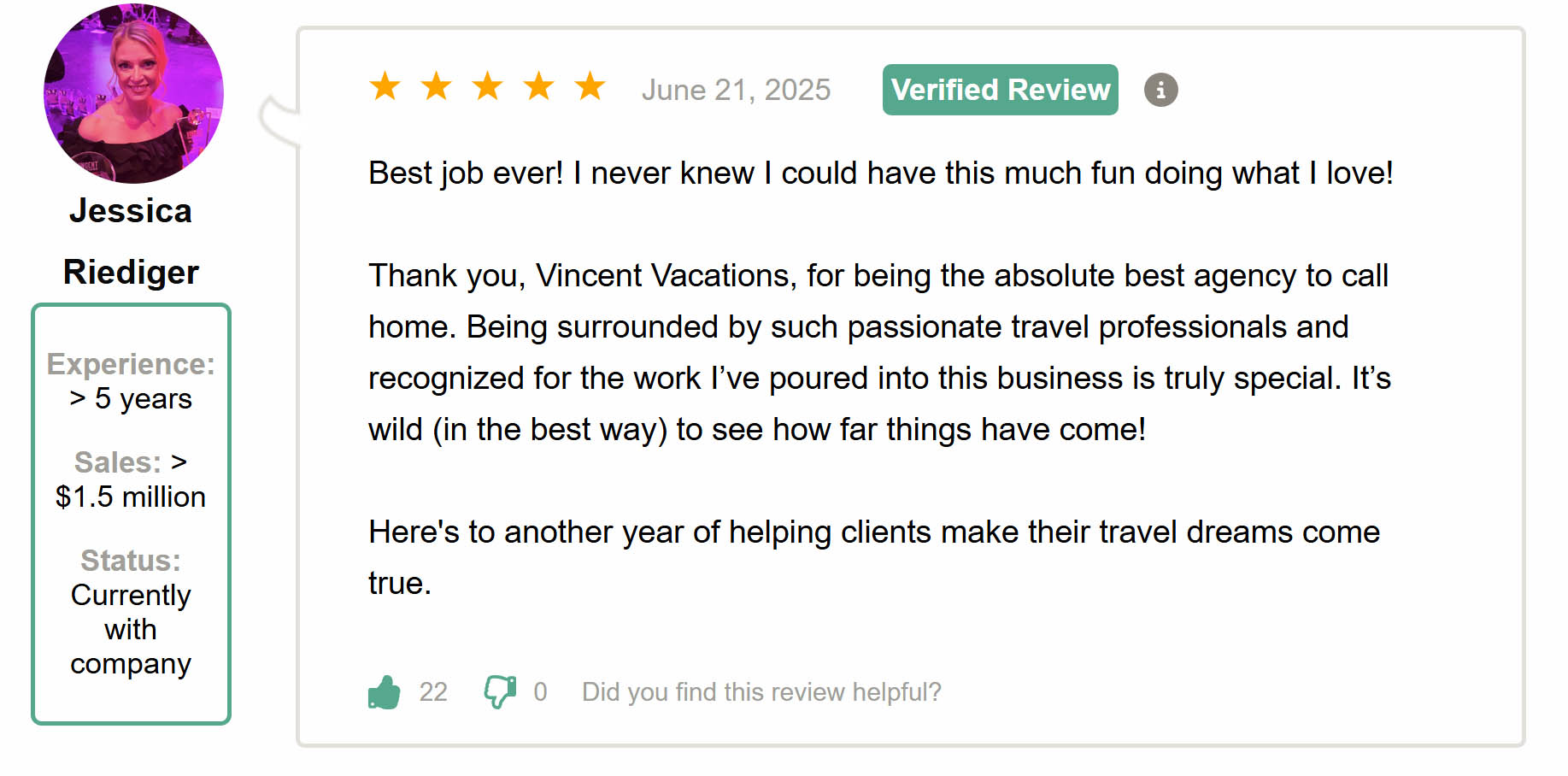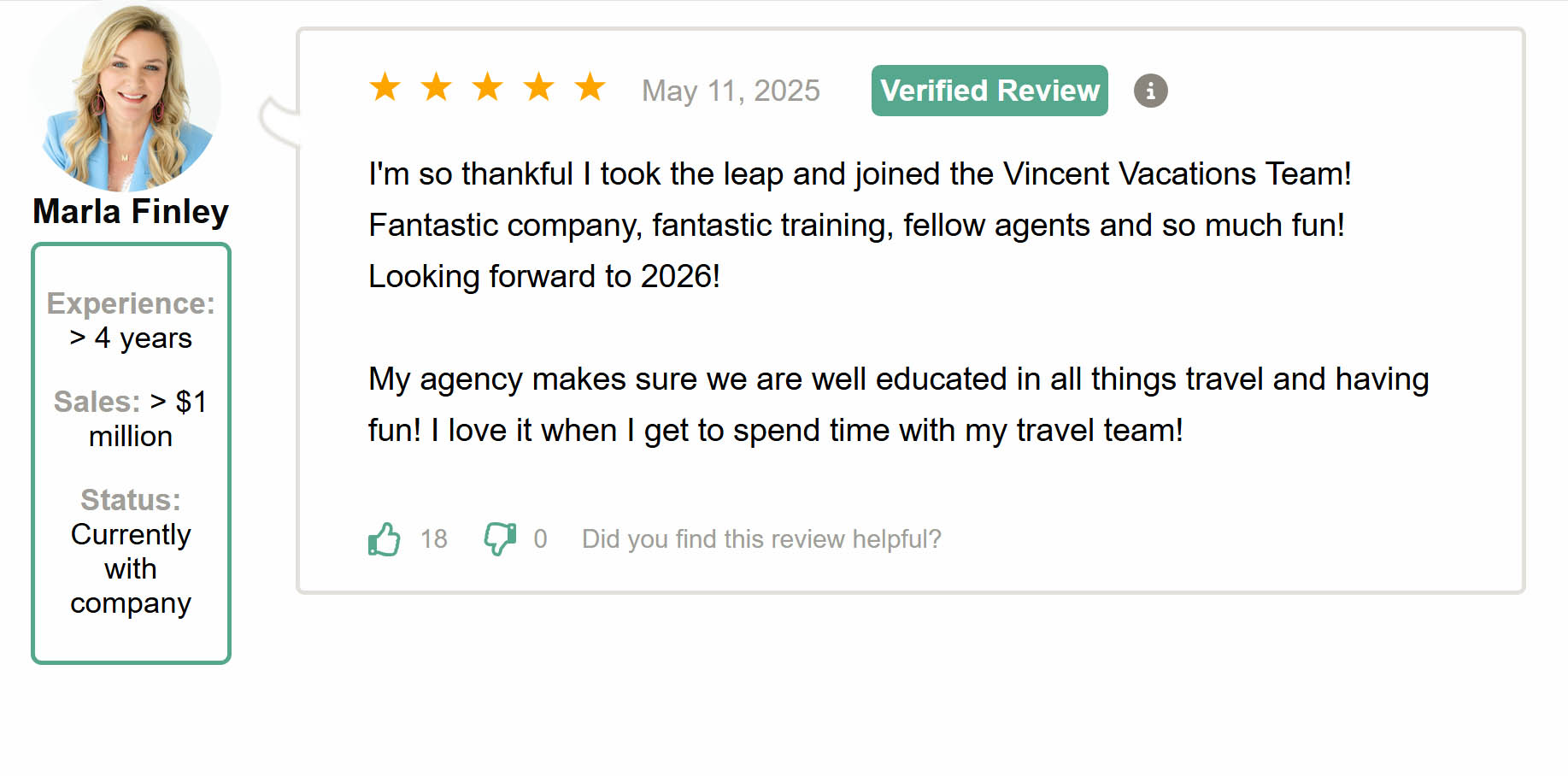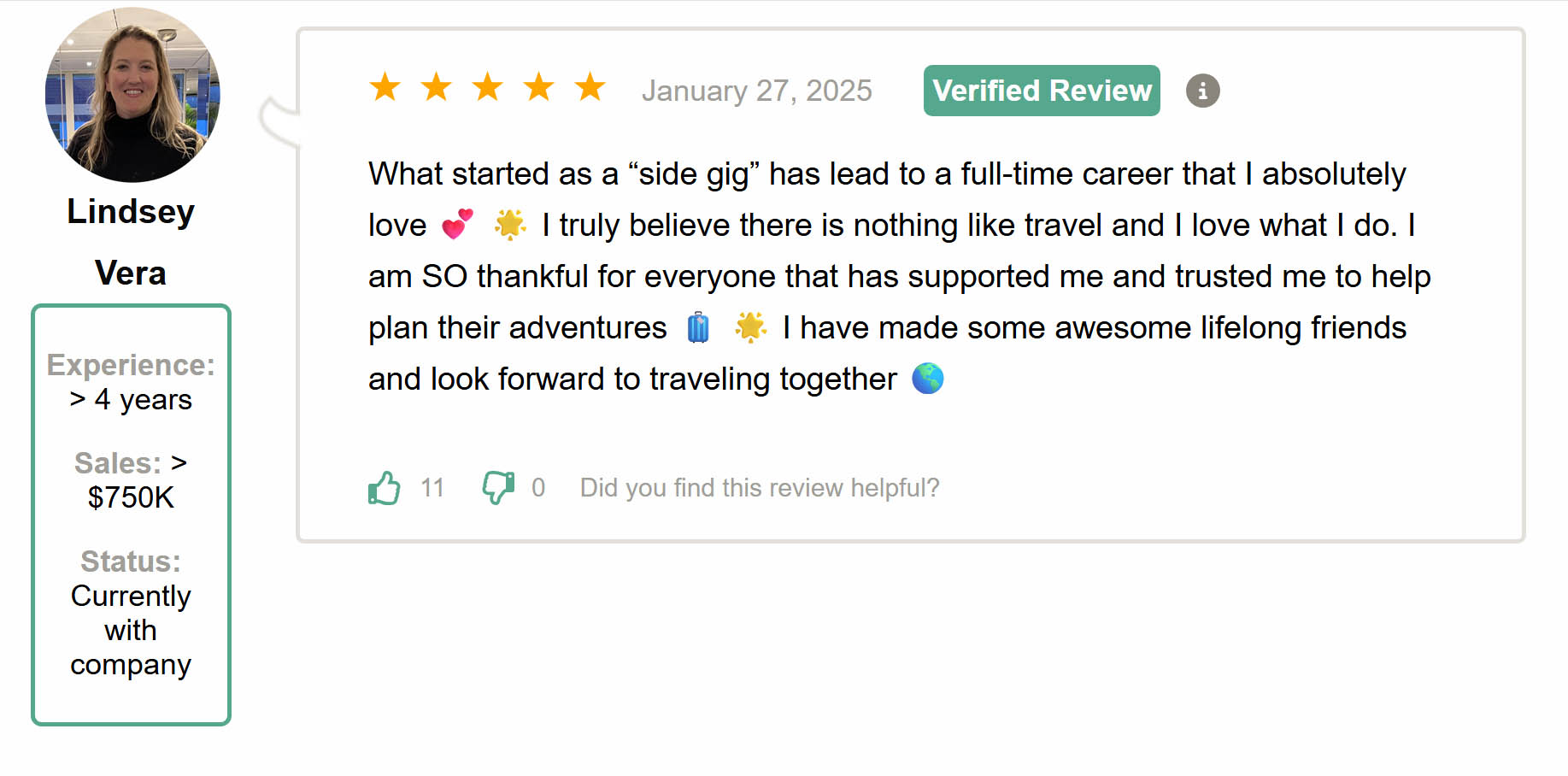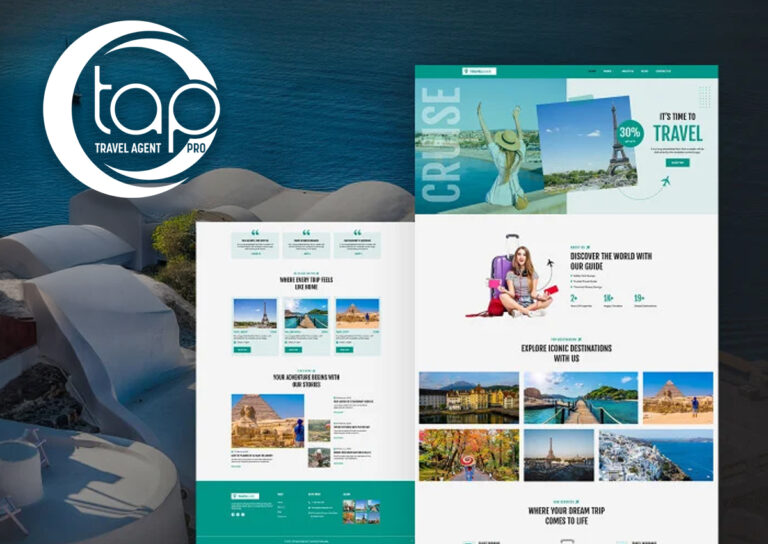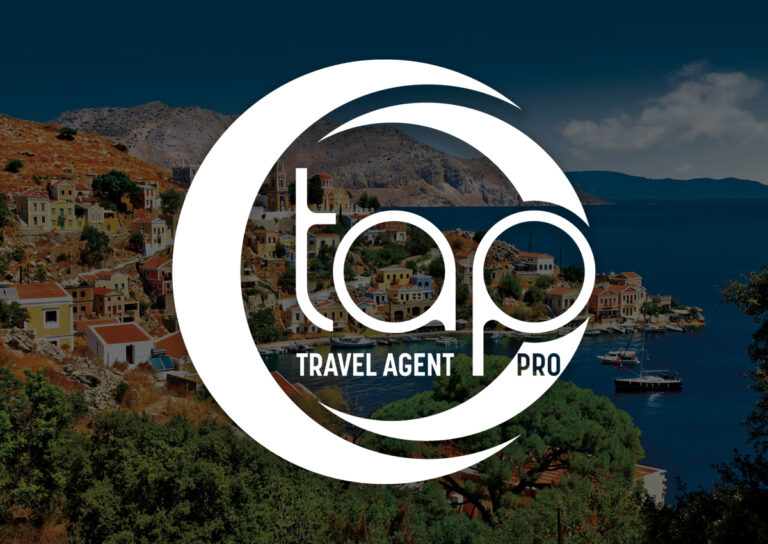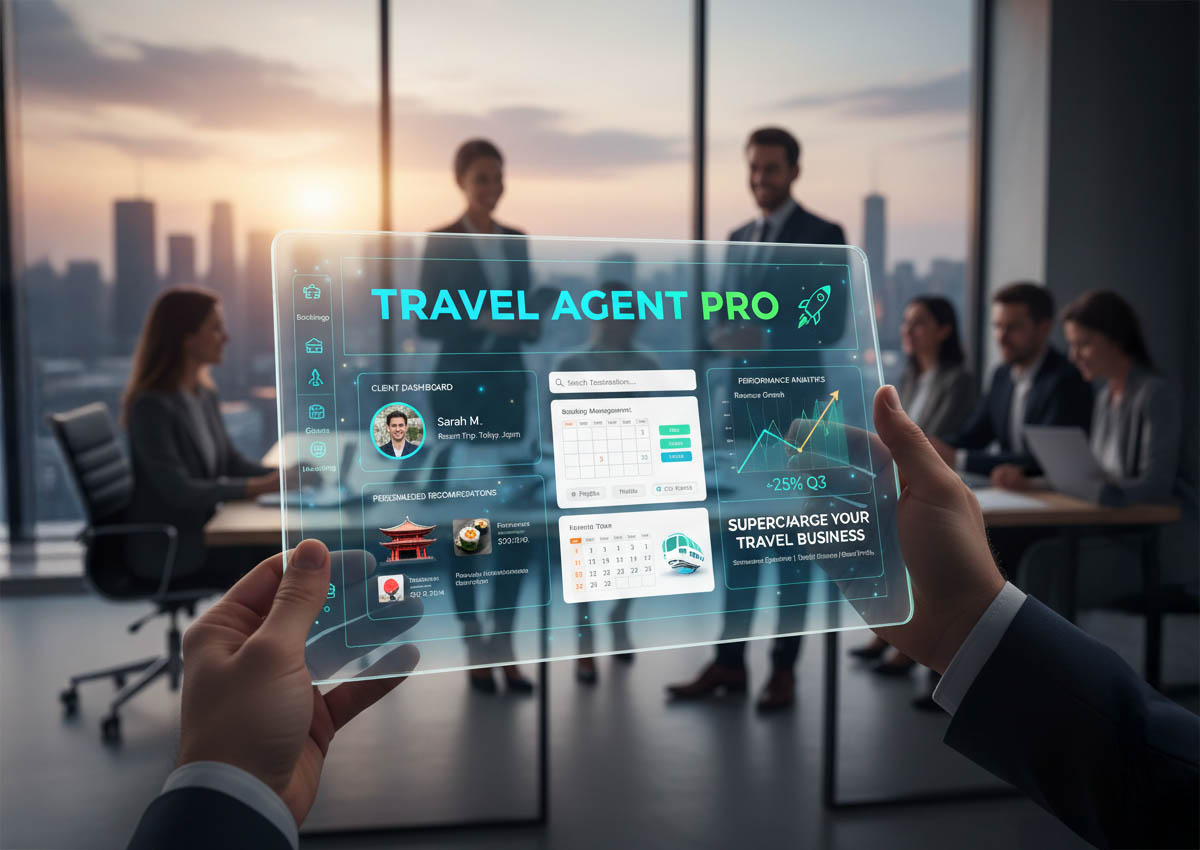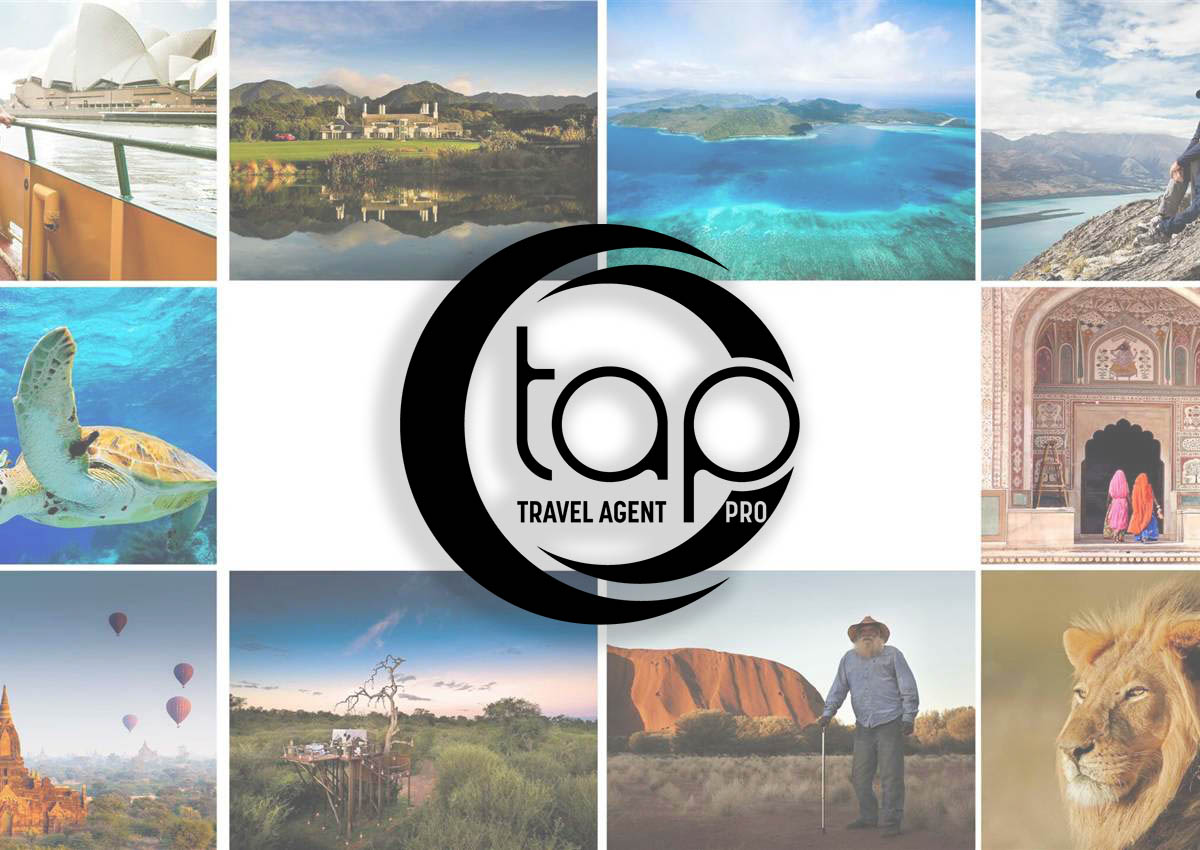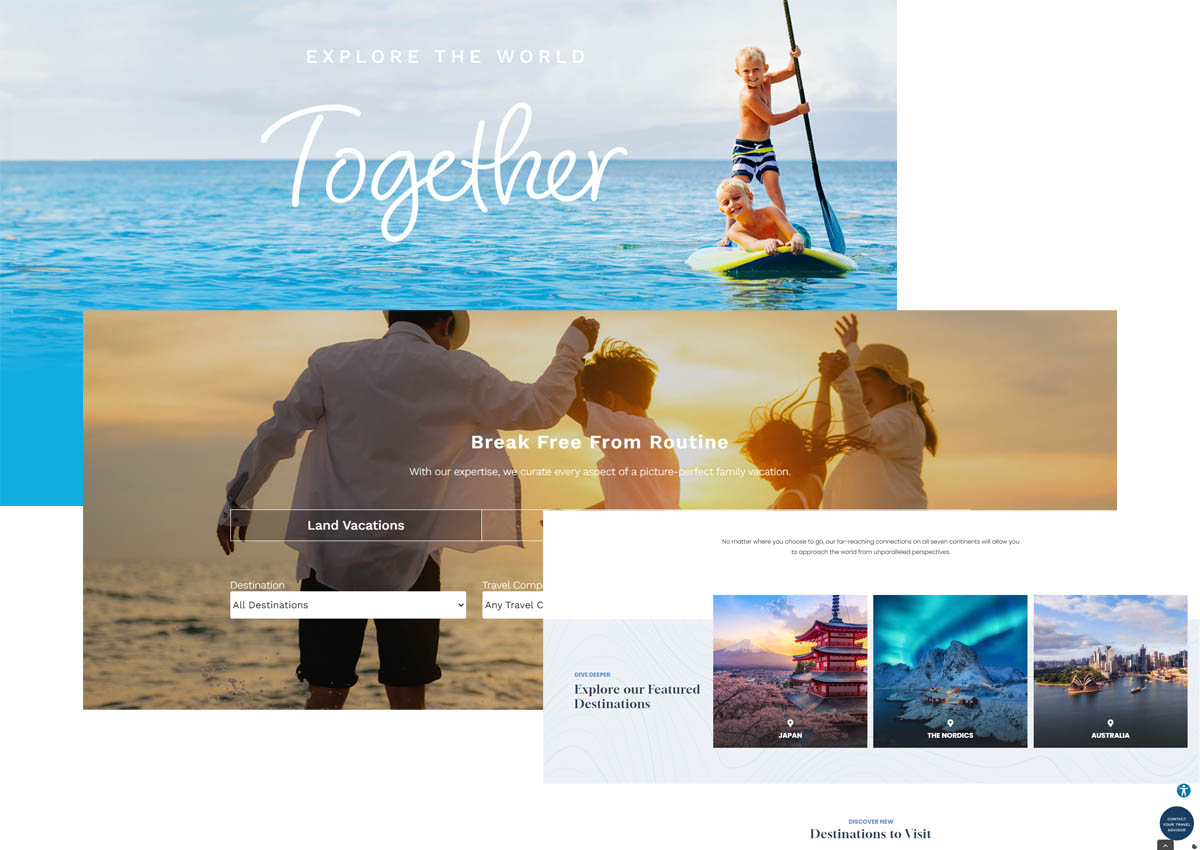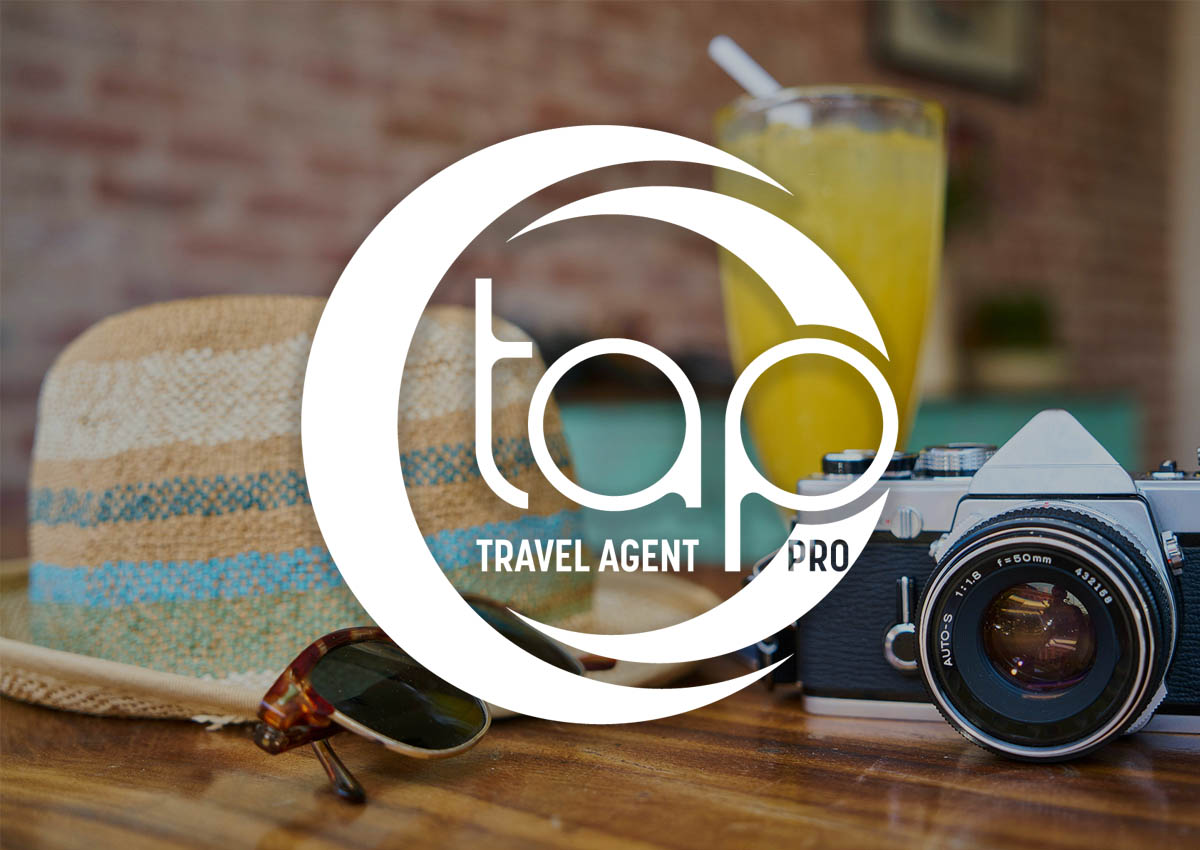Category :
GeneralA Strong Foundation - Business Plan for Independent Agents
To learn more techniques and how to create and grow your own travel business, sign-up to become a member today!

Starting your own travel agency as an independent agent is an exciting opportunity to combine your passion for travel with entrepreneurial spirit. Crafting a well-thought-out business plan is essential to set a clear roadmap for success and sustainability in this competitive industry.
Understanding your market, defining your unique services, and setting achievable goals will help you position your agency effectively. This plan will also guide your financial decisions and marketing strategies, making it easier to attract and retain clients.
Your Host Travel Agency
Launched by industry veterans, Vincent Vacations is working to carve out a niche as a boutique, community-driven option designed by advisors, for advisors.
Learn MoreWhat this article will cover
This guide will walk you through the key components of a travel agency business plan, including market research, service offerings, financial projections, and promotional tactics specifically designed for independent agents.
Building a successful travel agency business plan involves more than just numbers—it requires passion, creativity, and a deep understanding of your clients' needs. Whether you aim to specialize in luxury vacations, adventure travel, or corporate bookings, a solid plan will help you navigate challenges and seize opportunities in the travel industry.

Executive Summary for Independent Travel Agents
Business Concept and Unique Value Proposition
Starting as an independent travel agent means embracing the freedom to tailor travel experiences with a personal touch. Your business concept revolves around offering customized travel planning services that suit individual client preferences, budgets, and needs. Unlike large agencies, independent agents provide a more intimate, flexible, and responsive service, building strong client relationships based on trust and expertise.
Unique value comes from your deep knowledge of niche travel markets, ability to curate exclusive deals, and the agility to adapt quickly to changing travel trends and client demands. This positions you as not just a booking agent but a trusted advisor who crafts memorable journeys.
Key Objectives and Growth Targets
Setting clear objectives is essential for growth. Initially, your focus will be on:
- Building a loyal client base through referrals and positive reviews
- Establishing partnerships with suppliers and travel networks to access competitive pricing
- Developing a strong online presence to attract potential travelers
Growth targets could include increasing annual bookings by 20%, expanding service offerings to include luxury and adventure travel, and achieving a client satisfaction rate above 90%. These objectives ensure steady progress while maintaining quality service.
Summary of Financial Projections
Financial planning is a cornerstone of a sustainable travel agency. Your projections should include startup costs, expected monthly expenses, and revenue forecasts based on realistic booking volumes. For independent agents, initial investments might be modest, covering technology tools, marketing, and licensing.
| Category | Year 1 | Year 2 | Year 3 |
|---|---|---|---|
| Revenue | $50,000 | $70,000 | $90,000 |
| Expenses | $20,000 | $25,000 | $30,000 |
| Net Profit | $30,000 | $45,000 | $60,000 |
Additional Tips for Success
- Leverage social media to showcase unique travel stories and client testimonials.
- Continuously update your knowledge of travel regulations and emerging destinations.
- Offer personalized promotions and loyalty programs to encourage repeat business.

Company Overview and Legal Structure
Defining Business Ownership and Agent Status
Establishing a clear ownership structure is the foundation of any travel agency business plan for independent agents. Are you operating solo or collaborating with partners? Defining whether you are an independent agent, a franchisee, or part of a larger agency network affects your responsibilities and benefits.
Independent agents often enjoy flexibility and autonomy but must manage all aspects of the business themselves, including client relations and finances. Understanding your agent status early on helps clarify your legal obligations and operational scope.
Choosing the Appropriate Legal Entity (LLC, Sole Proprietorship, etc.)
Selecting the right legal entity is crucial as it impacts your taxes, liability, and business operations. Common options include:
| Entity Type | Liability Protection | Taxation | Complexity |
|---|---|---|---|
| Sole Proprietorship | None (personal liability) | Pass-through (personal income tax) | Simple setup and management |
| Limited Liability Company (LLC) | Limited liability protection | Flexible (can choose pass-through or corporate) | Moderate complexity |
| Corporation | Strong liability protection | Double taxation (unless S-Corp) | Complex, formal requirements |
Your Host Travel Agency
Launched by industry veterans, Vincent Vacations is working to carve out a niche as a boutique, community-driven option designed by advisors, for advisors.
Learn MoreFor many independent travel agents, forming an LLC is popular due to its balance of liability protection and tax flexibility. However, a sole proprietorship might be sufficient for small-scale operations with minimal risk.
Considerations when choosing your entity
- How much personal liability are you willing to assume?
- What are your expected income and tax implications?
- How complex do you want your business administration to be?
Registration, Licensing, and Compliance Requirements
Before officially operating, ensure that you complete all necessary registration and licensing requirements. These vary by location but generally include:
- Registering your business name with the appropriate government office
- Obtaining a business license or permit specific to travel agencies
- Complying with local, state, and federal regulations
- Securing necessary insurance, such as professional liability insurance
“Compliance is not just a legal formality; it builds trust with your clients and partners.”
Additionally, some states or countries require travel agents to register with tourism boards or consumer protection agencies. Staying updated with these requirements helps avoid fines and ensures smooth operation.

Industry and Market Analysis for Travel Agencies
Current Trends in Independent Travel Agency Sector
The independent travel agency sector is experiencing a dynamic transformation driven by evolving consumer preferences and technological advancements. More travelers are seeking personalized experiences, which has increased demand for agents who offer customized itineraries rather than generic package tours. Additionally, the rise of digital tools and online booking platforms has empowered independent agents to operate efficiently with lower overhead costs and greater reach.
Embracing technology is essential for success. Many independent agents now leverage social media, customer relationship management (CRM) systems, and virtual consultations to enhance client engagement and streamline operations. This sector also benefits from the growing trend of sustainable and eco-friendly travel, where agents curate environmentally responsible travel options.
Competitive Landscape and Niche Opportunities
The competitive landscape for independent travel agencies is diverse, ranging from boutique agencies specializing in luxury travel to those focusing on budget or adventure segments. Despite competition from large online travel agencies (OTAs), independent agents distinguish themselves through personalized service, expert knowledge, and trusted relationships with clients.
Niche markets present significant opportunities. Agents focusing on specific traveler demographics—such as solo travelers, honeymooners, or senior citizens—can develop a loyal clientele. Specialized knowledge in regions, cultural travel, or activities like scuba diving or culinary tours further enhances market positioning.
Example Niche Opportunities
- Eco-tourism and sustainable travel packages
- Destination weddings and honeymoons
- Accessible travel for travelers with disabilities
- Luxury and bespoke travel experiences
Target Market Segmentation and Customer Profiles
Understanding the target market is crucial for independent travel agencies. Market segmentation involves dividing potential customers into groups based on demographics, travel preferences, budget, and motivations.
| Segment | Characteristics | Travel Preferences |
|---|---|---|
| Young Professionals | Age 25-35, tech-savvy, budget-conscious | Adventure travel, city breaks, cultural experiences |
| Families | Parents with children, looking for safety and convenience | All-inclusive resorts, theme parks, nature trips |
| Retirees | Age 60+, seeking comfort and relaxation | Cruises, guided tours, wellness retreats |
| Luxury Travelers | High income, desire exclusivity and premium services | Private villas, first-class flights, unique experiences |
Crafting detailed customer profiles helps agents tailor marketing messages and service offerings. For instance, a travel agency focusing on retirees might highlight ease of travel and health considerations, while one targeting young professionals may emphasize unique and Instagram-worthy experiences.
“Knowing your customer is the key to creating travel experiences that delight and inspire.”
Become a Travel Agent: Unleash Your Full Potential
Ready for a career that's as fulfilling as it is rewarding? Becoming a travel agent with Vincent Vacations means building a business around your passion for travel.

Services and Product Offerings for Independent Agents
Independent travel agents thrive by offering personalized and flexible services tailored to their clients' unique travel needs. Customized travel planning and booking are at the heart of their offerings, ensuring every trip is crafted with care and attention to detail.
Customized Travel Planning and Booking Services
With a deep understanding of diverse destinations and traveler preferences, independent agents provide bespoke itineraries that go beyond standard packages. They assist clients through every step—from flight and accommodation bookings to local experiences—ensuring smooth and stress-free travel.
Specialized Packages: Luxury, Adventure, Corporate, and Group Travel
Independent agents often specialize in creating niche travel packages to cater to specific interests. These may include:
| Type | Description | Ideal For |
|---|---|---|
| Luxury Travel | Exclusive accommodations, premium services, and VIP experiences. | Affluent travelers seeking comfort and prestige. |
| Adventure Travel | Active trips including hiking, diving, safaris, and more. | Thrill-seekers and outdoor enthusiasts. |
| Corporate Travel | Efficient and budget-conscious planning for business trips. | Companies and professionals requiring seamless logistics. |
| Group Travel | Coordinated trips for families, friends, or organizations. | Travelers seeking shared experiences with others. |
Value-Added Services: Travel Insurance, Visa Assistance, and Concierge
To enhance client satisfaction and security, independent agents offer a range of value-added services including:
- Travel Insurance: Protects travelers from unforeseen events such as cancellations, medical emergencies, or lost luggage.
- Visa Assistance: Guides clients through visa application processes, ensuring compliance with international travel regulations.
- Concierge Services: Provides personalized support such as restaurant reservations, event tickets, and local recommendations.
“Offering these additional services not only builds client trust but also establishes the agent as a reliable travel expert.”
Why These Services Matter
Incorporating these value-added options differentiates independent agents from online booking platforms by adding human expertise and peace of mind to every journey.

Marketing and Customer Acquisition Strategies
Building a Personal Brand and Online Presence
Establishing a personal brand is essential for independent travel agents seeking to stand out in a competitive market. Your brand reflects your unique style, expertise, and values, helping customers connect with you on a personal level. Consistency in your messaging, logo, and tone across all platforms builds trust and recognition.
Start by creating a professional website that showcases your services, testimonials, and travel expertise. Use a blog or newsletter to share valuable travel tips and stories that highlight your knowledge and passion. This not only attracts visitors but also enhances your credibility.
Your Host Travel Agency
Launched by industry veterans, Vincent Vacations is working to carve out a niche as a boutique, community-driven option designed by advisors, for advisors.
Learn MoreUtilizing Social Media and Content Marketing for Lead Generation
Social media platforms are powerful tools for generating leads and engaging potential clients. By sharing inspiring travel content, special offers, and client success stories, you create a community interested in your services.
Focus on platforms like Instagram, Facebook, and LinkedIn where travel enthusiasts and professionals gather. Use a mix of posts, stories, live videos, and interactive polls to keep your audience engaged.
Effective content ideas include:
- Destination highlights with beautiful visuals
- Travel hacks and packing tips
- Client testimonials and reviews
- Behind-the-scenes looks at your booking process
Engage actively by responding to comments and messages promptly. Consider running targeted ads to reach specific travel demographics and expand your reach.
Partnerships with Travel Suppliers and Referral Networks
Building strong partnerships with travel suppliers such as airlines, hotels, and tour operators can expand your offerings and provide exclusive deals to your clients. These relationships often come with access to special rates and promotions unavailable to the general public.
Referral networks also play a crucial role in customer acquisition. Collaborate with complementary businesses like local event planners, corporate offices, or wellness centers to exchange referrals. This mutually beneficial relationship can increase your client base organically.
Pro Tip: Attend industry events and virtual conferences to network with suppliers and other agents, strengthening your professional connections.
| Benefit | Description |
|---|---|
| Access to Exclusive Deals | Gain special pricing and packages for clients |
| Expanded Service Offerings | Provide more comprehensive travel options |
| Increased Client Referrals | Grow your business through trusted recommendations |
| Enhanced Industry Knowledge | Stay updated on latest travel trends and opportunities |

Operations and Workflow Management for Independent Agents
Daily Booking and Client Management Processes
Managing daily bookings efficiently is crucial for independent travel agents to maintain client satisfaction and streamline operations. Organizing client information and trip details systematically helps prevent errors and delays. Many agents use checklists or digital planners to track pending bookings, confirmations, and payments.
Communication with clients should be clear and timely; sending booking confirmations and itinerary summaries via email or messaging apps adds a professional touch and builds trust.
Use of Technology: CRM Systems and Booking Platforms
Customer Relationship Management (CRM) systems are invaluable tools for independent agents. They centralize client data, track interactions, and remind agents of important follow-ups. Popular CRM platforms often integrate with booking engines, allowing agents to access flight, hotel, and tour availability within one interface.
Benefits of Using CRM and Booking Platforms
- Automated reminders for client communications
- Faster booking processes with integrated platforms
- Improved record-keeping for easier reporting and analysis
- Enhanced ability to personalize client experiences
Embracing technology not only improves efficiency but also helps independent agents compete with larger agencies by offering responsive and customized service.
Handling Customer Service and Post-Travel Follow-up
Exceptional customer service extends beyond booking. Independent agents should be prepared to assist clients during travel disruptions or changes, providing reassurance and solutions promptly.
"A satisfied traveler is the best advertisement for your business."
After clients return, post-travel follow-up is an opportunity to gather feedback, address any issues, and encourage repeat business. Sending thank-you notes or satisfaction surveys via email demonstrates care and professionalism.
| Activity | Purpose |
|---|---|
| Thank-you email | Express appreciation and reinforce relationship |
| Feedback survey | Identify areas for improvement |
| Special offers or loyalty incentives | Encourage future bookings |
Maintaining strong customer service throughout the travel cycle builds loyalty and establishes a reputation for reliability and care.
For Both Aspiring and Experienced Travel Advisors
Build a travel business doing what you love - on your own terms. Start booking trips the day you join, with a best-in-class education curriculum developed by industry experts.

Organization and Team Building for Independent Agents
Building a successful travel agency as an independent agent means carefully planning when and how to expand your team or outsource support. As your client base grows, so does the need for additional help to maintain excellent service and efficiency.
When and How to Expand Team or Outsource Support
Recognizing the right moment to expand is crucial. If you find yourself overwhelmed with routine tasks or unable to provide personalized attention to clients, it may be time to consider hiring or outsourcing.
Outsourcing administrative work, marketing, or customer support can be an affordable way to grow without the overhead of full-time staff.
Alternatively, hiring part-time or freelance agents can help manage increasing workloads while keeping flexibility. Prioritize roles that free you to focus on core business activities like client relations and travel planning.
Roles and Responsibilities in a Growing Agency
As your agency expands, defining clear roles becomes essential. This clarity helps maintain smooth operations and accountability.
| Role | Primary Responsibilities |
|---|---|
| Lead Agent | Client consultations, itinerary planning, vendor negotiations, and overall business strategy. |
| Support Staff | Booking management, administrative tasks, customer follow-up, and document preparation. |
| Marketing Coordinator | Social media management, advertising campaigns, and brand promotion. |
Establishing these distinctions early fosters teamwork and ensures every member understands their contribution to your agency’s success.
Training and Professional Development Opportunities
Continuous learning is the heartbeat of a thriving travel agency team. Investing in training and professional development builds confidence and expertise.
Encourage your team to pursue courses offered by travel associations or suppliers, which can provide valuable insights and networking opportunities.
Regular in-house training sessions also help align your team with your agency’s values and service standards, creating a cohesive and knowledgeable workforce ready to delight clients.

Financial Planning and Budgeting for Independent Travel Agents
Starting a travel agency as an independent agent requires careful financial planning to ensure your business gets off on the right foot and remains sustainable. This section explores key aspects such as startup costs, revenue strategies, and managing cash flow effectively.
Startup Costs and Capital Requirements
Launching your independent travel agency involves several initial expenses that you need to anticipate and budget for. These may include:
| Expense Category | Description | Estimated Cost Range |
|---|---|---|
| Licensing and Registration | Business licenses, permits, and any required certifications | $200 - $1,000 |
| Technology | Computer, travel booking software, website development | $1,000 - $5,000 |
| Marketing and Branding | Logo design, business cards, online ads, promotional materials | $500 - $3,000 |
| Office Setup | Furniture, internet service, phone line, utilities | $500 - $2,000 |
| Initial Working Capital | Funds to cover operational expenses until revenue starts | $2,000 - $10,000 |
Tip: It is wise to overestimate your capital needs slightly to accommodate unexpected expenses and to ensure smooth operations during your first months.
Revenue Streams and Pricing Strategies
Independent travel agents can generate income from multiple sources. Understanding and diversifying your revenue streams will help you build a robust business model.
Your Host Travel Agency
Launched by industry veterans, Vincent Vacations is working to carve out a niche as a boutique, community-driven option designed by advisors, for advisors.
Learn MoreWhen setting prices, consider using a combination of competitive pricing and value-based pricing. For example, charging transparent service fees can communicate professionalism and justify your expertise.
“A clear pricing strategy not only helps your clients understand your value but also ensures your business remains profitable over time.”
Cash Flow Management and Profitability Forecasts
Effective cash flow management is vital for independent agents since travel bookings often involve payments and refunds that can fluctuate.
Key Practices for Managing Cash Flow
- Maintain a detailed cash flow forecast to anticipate income and expenses monthly.
- Set aside reserves for peak seasons and slow periods.
- Use accounting software to track receivables and payables efficiently.
- Negotiate favorable payment terms with suppliers.
Projecting profitability involves analyzing your expected revenues against fixed and variable costs. By regularly reviewing these forecasts, you can make informed decisions about scaling your business or adjusting your strategies.
Remember: Financial planning is an ongoing process. As your travel agency grows, revisit your budgets and forecasts to adapt to changes in the market and your business goals.

Risk Management and Legal Considerations
For independent travel agents, understanding risk management and legal responsibilities is crucial to building a sustainable business. This section covers the essential areas every agent should address to protect themselves and their clients.
Insurance Needs: Liability, Errors & Omissions
Insurance is a foundational element of risk management. Liability insurance protects you if clients claim damages due to your services, while Errors & Omissions (E&O) insurance covers mistakes or oversights in booking or advice.
“Investing in the right insurance coverage is a proactive step to safeguard your travel agency’s future.”
Compliance with Travel Industry Regulations
Travel agents must adhere to various regulations that govern the industry, including consumer protection laws, data privacy rules, and licensing requirements. Staying informed about these regulations helps avoid legal penalties and builds client trust.
Examples of common regulatory areas to monitor
- Consumer rights: Transparency in pricing, cancellation policies, and refund procedures
- Data protection: Secure handling of client personal and payment information
- Licensing: Ensuring proper credentials and registrations at local and national levels
Contingency Planning for Travel Disruptions
Unexpected events like natural disasters, political unrest, or pandemics can disrupt travel plans. Developing a robust contingency plan is essential for managing these risks effectively.
| Aspect | Description |
|---|---|
| Communication protocols | Clear methods to inform clients promptly of changes or emergencies |
| Alternative arrangements | Pre-planned options for rebooking, refunds, or cancellations |
| Supplier relationships | Strong partnerships to facilitate flexibility and support during crises |
| Documentation | Contracts and policies outlining responsibilities and processes |
By anticipating potential disruptions and preparing solutions in advance, independent agents can maintain client confidence and minimize financial losses.
From Passion to Profit
Vincent Vacations provides unparalleled benefits to both new and experienced travel agents. We empower you to deliver exceptional value to your clients and elevate your career.

Growth Strategies and Scaling Your Independent Travel Agency
Growing your independent travel agency requires a thoughtful approach that balances expanding your offerings, leveraging technology, and building lasting client relationships. Each of these elements plays a crucial role in scaling your business effectively and sustainably.
Expanding Service Offerings and Market Reach
One of the most effective ways to grow your agency is by broadening the range of services you provide. This could include:
- Offering specialized travel packages such as adventure tours, luxury escapes, or eco-friendly trips.
- Partnering with local businesses or international suppliers to create unique experiences.
- Targeting new market segments, like corporate clients, solo travelers, or family vacations.
Expanding your market reach can also involve tapping into digital marketing channels, attending travel expos, or joining global travel networks. These strategies help you attract a wider audience and diversify your customer base.
Leveraging Technology for Automation and Efficiency
Technology is a powerful ally in streamlining operations and boosting productivity. Consider integrating:
| Technology | Benefit |
|---|---|
| Customer Relationship Management (CRM) Systems | Organize client data and personalize communication |
| Booking and Reservation Software | Automate bookings and reduce manual errors |
| Social Media and Marketing Automation | Engage clients consistently with minimal effort |
Automation frees up your time, allowing you to focus on creative solutions and client care. Additionally, embracing digital payment platforms and mobile-friendly interfaces enhances the customer experience, making it easier for clients to book and pay.
Building Long-Term Client Relationships and Loyalty Programs
Client retention is just as important as acquiring new customers. Developing strong, long-term relationships leads to repeat business and referrals. Strategies include:
“Personalized communication, prompt follow-ups, and consistently exceeding expectations build trust and loyalty.”
Implementing a loyalty program rewards returning clients and encourages them to book again. This can be as simple as offering discounts, exclusive deals, or early access to promotions. Consider these tips:
- Send personalized thank-you notes after trips.
- Gather feedback to improve your services continuously.
- Host special events or webinars to engage your community.
By combining thoughtful growth strategies with attentive service, your independent travel agency can thrive, building a reputation that attracts both new and loyal customers alike.

Conclusion
Developing a solid business plan is essential for independent travel agents aiming to build a successful travel agency. It serves as a roadmap that outlines your goals, strategies, and the steps necessary to achieve sustainable growth and profitability.
Keep in mind that understanding your target market, establishing a unique value proposition, and managing finances carefully are the pillars of your business’s success. By clearly defining your niche and leveraging your personal connections, you set yourself apart in a competitive industry.
Remember, flexibility and continuous learning will empower you to adapt to changing travel trends and customer preferences. Your passion and dedication as an independent agent can transform your travel agency into a trusted brand that clients rely on for unforgettable experiences.
“Success in the travel industry comes from combining expert knowledge with genuine customer care.” – Industry Expert
Take the time to invest in building your business plan thoughtfully, and it will act as your guide through the exciting journey of entrepreneurship in travel.
Learn more about this by signing up as a member, today! Vincent Vacations Application Form.
To learn more techniques and how to grow your travel business, read more on our Articles page.





